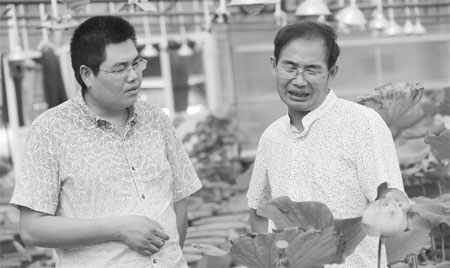Rescuing the lotus flower in 'Cement City'
|
Liu Duan (right) chats with his colleague at his lotus farm in Guigang. Huo Yan / China Daily |
You would never know Guigang's past dubbed "lotus city" from its looks today. Some locals are just trying to reconstruct an old Guigang that is still living in their memories.
All main roads there are made with cement. The road surface is invariably crushed by heavy trucks carrying cement. The smoggy air is thick with pungent smells discharged from the cement factories.
Forty years ago, long before the two big cement companies from Hong Kong and Taiwan saw the Karst hills in the city, Guigang looked different. Three rivers meander through the city. Hundreds of small lakes dotted the plains in the valleys. Dozens of species of lotus flowers flourished in the natural waters.
It was famous for its jack fruit, lotus root, longan, tippy tea, fish, rice, and as a place with milk and honey. Even the great famine in the early 1960s in China did not leave a scar in local people's memory thanks to its time-honored agricultural tradition of intensive and meticulous farming in an ideal natural environment.
The border conflict between China and Vietnam procrastinated the opening of the whole Guangxi until the late 1980s.
The late bird flies fast. The rich water resources, non-ferrous metal mines, limestone hills, natural woods and a government thirsty for growth have attracted flocks of businessmen from neighboring Guangdong since the early 1990s.
Guigang earned new names as "cement city" and "down city". The factories not only boost the economy with their outputs, but also reshape the city's looks with their waste.
"When asked where to find a lotus flower in Guigang several years ago in a photography show in Guangdong, I felt really ashamed that lotus almost die out in my hometown," said Liu Duan, a local chain supermarket owner and a photographer from Guigang.
After that, Liu started two breeding bases of lotus in the city to rescue the dying-out flowers in a bid to match the city with its old name. Each year he organizes a lotus festival in Guigang to raise the public's awareness of the "holy flowers," which symbolize lofty morality and pureness.
Liu Duan thinks the spiritual meanings represented by the lotus bear special relevance to Guigang today. He hinted that both the government and the environment should be clean.
Hundreds of lotus in flowerpots and thousands of lotus seeds are gifted to the residents during the activity. But few businessmen would like to join him because of the poor return.
"I just want to maintain the lotus' roots in people's minds. After most of the natural lakes disappeared, the lotus had actually been uprooted from the city," said Liu.
He invited a young agricultural technician, Liu Peng, who is from a family taking care of the plant for generations in Anhui province, to help him. They collected seeds from around the world and select the fittest for the local climate and water.
But the expensive lotus is not popular among local consumers.
"I know it is hard job. It is his sincerity that touched me and settled my mind to come all the way to Guangxi to help him rebuild the 'lotus city' of Guigang," said Liu Peng.
"I would never forget one day two years ago when we went to rescue the wild lotus in a lake that was being dried up by the real-estate developers. Each seed we dug from the mud is a treasure," recalled Liu Peng.
The city government supports Liu Duan's project and offers him a showcase fountain pond in front of the government building to plant lotus.
Contact the writer at liyang@chinadaily.com.cn



















